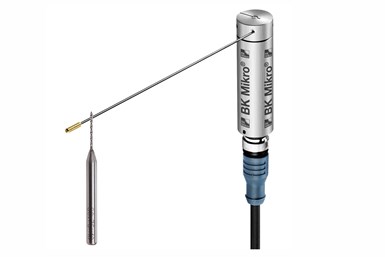Broken Tool Detection for Tight Workspaces
PMTS 2023: Techna-Tool’s BK Mikro tool and process monitoring helps ensure machines are producing quality parts, particularly during unattended or lights-out machining, before broken tools can cause bigger problems.
Techna Tool’s TK7A/RL scanner is best suited for tight spaces where a larger scanner may not fit, such as a Swiss-style machine or multi-spindle head. Photo Credit: Techna-Tool
Techna-Tool’s BK Mikro broken tool detection system is essential for ensuring part quality and preventing machine crashes. The BK Mikro stops the machine immediately when a broken tool is detected. This eliminates additional broken tools and hours of sorting parts.
The two scanner variations of the type TK7 have identical features. The only difference is that in variation “A” the rotational movement is limited by a mechanical stop inside the housing while the scanner “RL” can rotate in both directions without stopping. This is for checking two tools. These scanners are best suited for tight spaces where a larger scanner may not fit, such as Swiss style machines or multi-spindle heads.
The TK96 series scanner is the most compact in the BK Mikro line and comes with a durable stainless steel body which helps resist wear from chips and other flying debris. With a diameter of only 12 mm, it is also well suited for tight spaces where other scanners may not fit. Because of its small size, it provides a smaller area for chips and other debris to collect. Two scanner variations, “A” and “RL”, are available for either checking one or two tools.
The TK7A/RL and TK96A/RL scanners feature 20-mm or 12-mm diameters which work well for mounting in small spaces such as Swiss machines. They can check tools as small as 0.1 mm without damaging the tool. A servo motor with encoder ensures accurate checking results. They offer single or bidirectional checking for one or two tools. Free space monitoring verifies part ejection from subspindle or part cutoff confirmation.
The scanners are easily retrofitted to most Swiss-types, lathes or turn-mills, and IP68 rated to withstand the harshest environments.
Related Content
-
Sita’s CleanoSpector Measures Part Cleanliness
PMTS 2023: Handheld measuring device checks for cleanliness of parts to assure product quality as well as prior to follow-up processes.
-
Compact Micro Turn-Mill for Small Precision Parts
PMTS 2023: The Spinner PD-CNC lathe can achieve high levels of precision due to its high-precision spindles, pneumatic clamping cylinders with programmable clamping force, ultraprecise ball screws, and hardened and ground sliding vibration-damping guideways.
-
PMTS 2023: Discovering Precision Machining Technology Under One Roof
Like Production Machining, trade shows such as PMTS enable you to discover new shopfloor equipment, technology and ideas that can help boost your shop’s efficiency and profitability.
















.png;maxWidth=300;quality=90)
